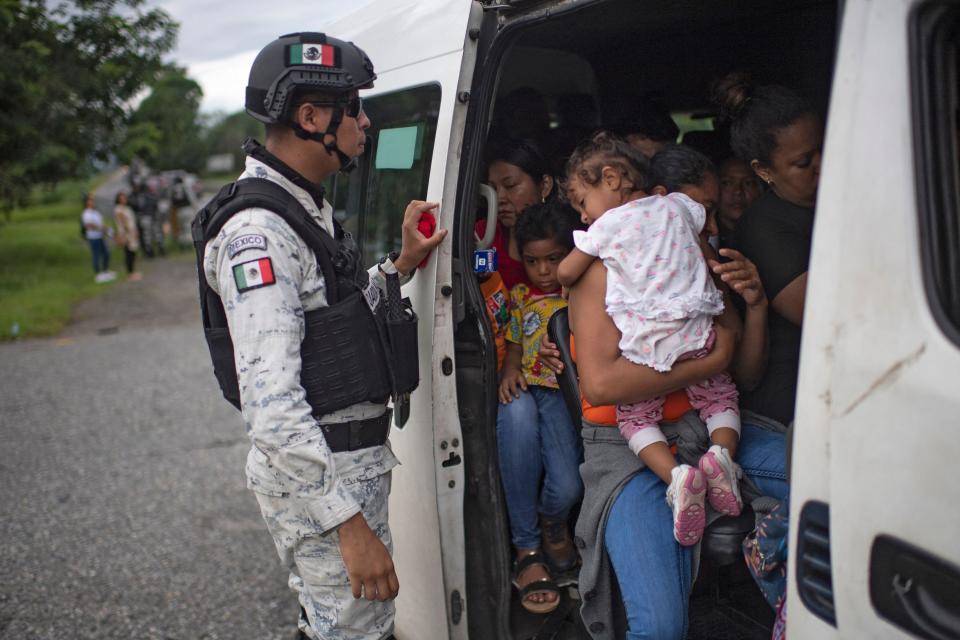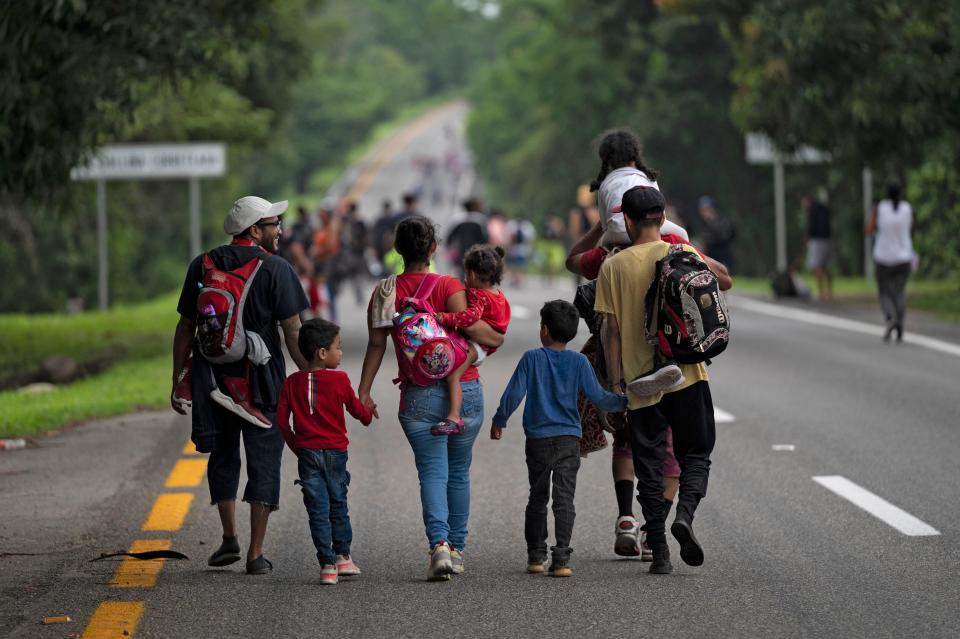Biden seeks help of Latin American nations to curb unlawful migration
President Biden and representatives from 19 other Western Hemisphere countries on Friday unveiled a migration accord at the Summit of the Americas in Los Angeles that the White House hopes will help the U.S. reduce the historic levels of migrants arrivals along the southern border over the past year.
The agreement, formally known as the Los Angeles Declaration on Migration and Protection, centers on stabilizing communities in Latin America, expanding lawful means of immigration, bolstering "humane" border enforcement across the region and collaborating on responses to the displacement of people.
By joining the pact, the U.S. and other nations committed to increasing temporary work visas to discourage unlawful immigration and mitigate labor shortages in the U.S., Canada and Mexico; expanding refugee resettlement and family reunification programs; increasing support for countries hosting large numbers of migrants; and collaborating on efforts to dismantle human smuggling networks.
The Biden administration will expect signatories to expand screenings of migrants in their territory so countries south of the U.S. can more quickly grant asylum to those who qualify for humanitarian protection and deport those who don't, a senior administration official told reporters Thursday..
The U.S. government, the official added, will also commit to providing additional humanitarian aid to Haiti to discourage unauthorized migration from the Caribbean nation, which over the past year has seen a record number of its citizens flee to the U.S. by land and sea.
"The Western Hemisphere as a region is undergoing historic and unprecedented rates of irregular migration," the senior administration official said. "Nearly every country has been impacted."
Argentina, Barbados, Belize, Brazil, Canada, Chile, Colombia, Costa Rica, Ecuador, El Salvador, Guatemala, Haiti, Honduras, Jamaica, Mexico, Panama, Paraguay, Peru and Uruguay agreed to sign the U.S.-led declaration.

The Biden administration hopes the migration accord will be one of the landmark achievements of the Los Angeles summit, the first to be held on U.S. soil since 1994.
But the declaration's immediate impact on the unprecedented migration flows to the U.S.-Mexico border will likely be limited, and its long-term effectiveness will hinge on the cooperation of a diverse set of governments, some of which have increasingly resisted demands from Washington.
The summit has also been marred by controversy over the Biden administration's decision to exclude the leftist regimes in Cuba, Nicaragua and Venezuela from the event, and the absence of leaders from El Salvador, Guatemala, Honduras and Mexico, some of whom declined to attend because of the exclusions.
Roughly 75% of the migrants who entered U.S. Customs and Border Protection (CBP) custody in April, the last month with available statistics, were from Cuba, El Salvador, Guatemala, Honduras, Nicaragua, Mexico and Venezuela.
What the countries are pledging
According to a U.S. outline of the accord, Belize agreed to legalize Central American and Caribbean migrants who have been living there; Colombia committed to extending temporary status to 1.5 million Venezuelans by the end of the summer; Costa Rica pledged to offer legal protections to migrants from Cuba, Nicaragua and Venezuela; and Ecuador said it would expand a legalization program for Venezuelans in its territory.
Among other steps, the Mexican government agreed to increase temporary permits for migrants hoping to work in southern Mexico and launch a new program to bring in 15,000 to 20,000 Guatemalan laborers each year. According to the U.S. outline, Mexico intends to expand that program to include Honduran and Salvadoran workers.
Canada, meanwhile, will commit to resettling additional refugees from the Western Hemisphere, including French-speaking Haitians. It also expects to receive 50,000 temporary workers from Mexico, Guatemala and the Caribbean in 2022. Spain, an observer state in the summit, agreed to double the number of work visas for Hondurans, the U.S. outline said.
The U.S. committed to allocating $25 million for countries implementing new migrant legalization programs, including Costa Rica and Ecuador, and to distributing another $314 million to help displaced communities in the Western Hemisphere, including Venezuelans.
The State Department said the U.S. plans to welcome 20,000 refugees from the Western Hemisphere over the next two years, including an increased number of Haitians.
Asked how the U.S. will ensure that all countries follow through on the commitments they make in the accord, the official said the administration will maintain an "open dialogue" on its implementation but "will certainly expect that all countries do their part."

Record numbers of migrants have been apprehended along the U.S. southern border in recent months. Since October 2021, U.S. authorities there have processed migrants approximately 1.3 million times, many of them more than once, putting that tally on track to exceed the record 1.7 million migrant arrests reported in fiscal year 2021, government data show.
U.S. border agents have continued to turn back the majority of migrant adults to Mexico or their home countries using a Trump-era pandemic-related measure known as Title 42 that a federal court prevented the Biden administration from ending. The rule blocks migrants from requesting asylum on public health grounds.
In recent months, however, a growing number of migrants have not been processed under Title 42, requiring border officials to allow them to request asylum, a right enshrined in U.S. law and an international refugee treaty.
Many of the migrants U.S. border officials have allowed to seek asylum in recent months hailed from Cuba and Nicaragua which, due to strained diplomatic relations, have limited the number of their citizens they allow the U.S. to deport back to their home countries.
While arrests at the U.S.-Mexico border have reached record levels, partly because of a high rate of repeated crossings, Biden administration officials have underscored that other countries in the Western Hemisphere have also received large numbers of migrants and asylum-seekers as part of a broader displacement crisis.
Colombia, for example, has hosted and provided temporary status more than a million Venezuelans who fled economic turmoil and political repression in their homeland. Costa Rica has received hundreds of thousands of Nicaraguans.
Noting an increase in "secondary movement" of migrants in the hemisphere, the senior administration official said the U.S. is committed to providing additional resources to countries hosting displaced foreigners.
"This is a region that has a long tradition of solidarity, welcoming one's neighbors," the official said. "But the impact of COVID and now the Russian aggression in Ukraine, we're seeing it's a lot harder for countries to be welcoming."
Play-by-play announcer shows representation matters to girls

